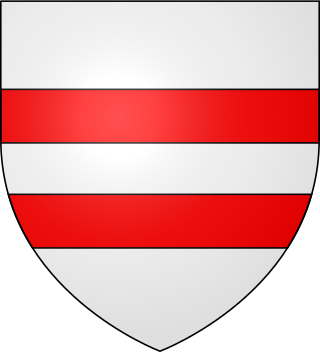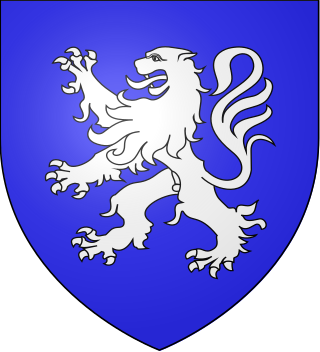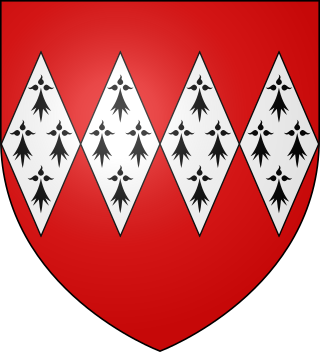Related Research Articles
Baron Strabolgi is a title in the Peerage of England supposedly created in 1318 for Scottish lord David of Strathbogie, 10th Earl of Atholl. Despite lack of evidence supporting its existence, it was called out of abeyance by the House of Lords in 1916. Whether it ever existed before then is open to serious dispute.

Baron FitzWalter is an ancient title in the Peerage of England. It was created on 24 June 1295 for Robert FitzWalter. The title was created by writ, which means that it can descend through both male and female lines.

Baron Strange is a title which has been created four times in the Peerage of England. Two creations, one in 1295 and another in 1326, had only one holder each, upon whose deaths they became extinct. Two of the creations, that of 1299 and that of 1628, are extant. The surname Le Strange was Latinized as Extraneus. The arms of Le Strange of Knockin Castle in Shropshire were: Gules, two lions passant argent.
Baron Lisle was a title which was created five times in the Peerage of England during the Middle Ages and Tudor period, and once in the Peerage of Ireland in the 18th century.

Baron Greystoke is a title that has been created twice in the Peerage of England. It was first created when John de Greystok was summoned to Parliament in 1295.

FitzMartin or Fitz Martin was the surname of a Norman family based in England and Wales between 1085 and 1342.
The title Baron Latimer or Latymer has been created, by the definitions of modern peerage law, four times in the Peerage of England. Of these, one was restored from abeyance in 1913; one is forfeit; the other two are dormant, although their heir is well known.
A writ in acceleration, commonly called a writ of acceleration, is a type of writ of summons that enabled the eldest son and heir apparent of a peer with more than one peerage to attend the British or Irish House of Lords, using one of his father's subsidiary titles, during his father's lifetime. This procedure could be used to bring younger men into the Lords and increase the number of capable members in a house that drew on a very small pool of talent.

The title Baron Moels was created once in the Peerage of England, in 1299, and passed into abeyance with the death of the fourth lord in 1337. The four men who by modern usage are held to have been Barons Moels were:

Roger de Montalt, 1st Baron Montalt (1265–1297) was a baron who rebelled for a time against Henry III of England. Roger was one of the sons of Sir Robert de Monaut, Knight. Robert married Joan Mowbray. Joan (1247–1284) was born in Pontefract, W-Riding, Yorkshire. Roger was the brother of another Robert de Montalt.

Baron FitzWarin was a title in the Peerage of England created by writ of summons for Fulk V FitzWarin in 1295. His family had been magnates for nearly a century, at least since 1205 when his grandfather Fulk III FitzWarin obtained Whittington Castle near Oswestry, which was their main residence and the seat of a marcher lordship.

Baron Dynham is a title which has been used twice in the English peerage, for:
The Feudal barony of Cardinham is one of the three feudal baronies in Cornwall which existed during the medieval era. Its caput was at Cardinham Castle, Cornwall. The Barony was held in recent times by the Vivian family, the last being Nicholas Vivian, 6th Baron Vivian. Brigadier Nicholas Crespigny Laurence Vivian, 6th Baron Vivian, conveyed the title to John Anthony Vincent of Edifici Maxim's, Carrer General, Arsinal, Principat Andora, in 1995. Mr. Vincent was a member of the Manorial Society of Great Britain and died in Douglas, Isle of Man, on 31 March 2018. The Barony was then conveyed after the probate of his estate to an American citizen on 25 May 2019.

There have been four different baronies held by the Marmion family, two feudal baronies, one purported barony created by Simon de Montfort and one barony by writ.

Baron Everingham is an abeyant title in the Peerage of England. It was created by Writ of summons to Parliament of Adam de Everingham of Laxton, Nottinghamshire, on 4 March 1309. It passed to his son Adam but fell into abeyance upon the death of his childless grandson Robert in 1371.
Baron Vesci was a title in the Peerage of England and Peerage of the United Kingdom. It existed as a feudal barony by tenure, before being created by Writ of summons to Parliament of John de Vesci in 1264 until his death in 1289. It was created a second time by writ of William de Vescy in 1295 until his death in 1297. It was created a third time in 1313 by writ of William de Vesci until his death in 1314. The title was created a fourth time by writ for Sir Henry Bromflete, created Baron Vessy in 1449, but became extinct upon his death in 1469. The title was created a fifth time for John Vesey, 4th Viscount de Vesci in 1884 until his death in 1903 when the title became extinct.
Baron Basset of Drayton of Drayton in the county of Stafford was a title in the Peerage of England.

Robert fitzRoger (1247–1310), Lord of Warkworth, Clavering and Eure, was an English baron. He was a son of Roger FitzJohn and Isabel de Dunbar. FitzRoger fought in the wars in Wales, Gascony and Scotland.
Baron FitzReginald was a title in the Peerage of England. It existed as a feudal barony by tenure, before being created by Writ of summons to Parliament of John FitzReginald in 1294 until his death in 1310, when the title became extinct.

John de Moels, 1st Baron Moels, feudal baron of North Cadbury in Somerset, was an English peer.
References
- Nicolas, Nicholas Harris. A synopsis of the peerage of England exhibiting, under alphabetical arrangement, the date of creation, descent and present state of every title of peerage which has existed in this country since the conquest. J. Nichols and son, London, 1825. p. 132